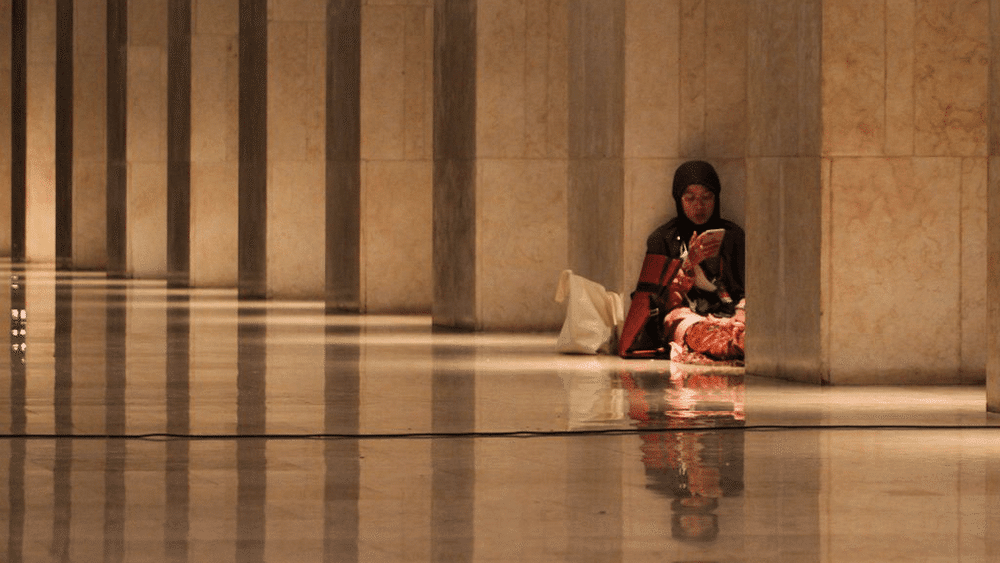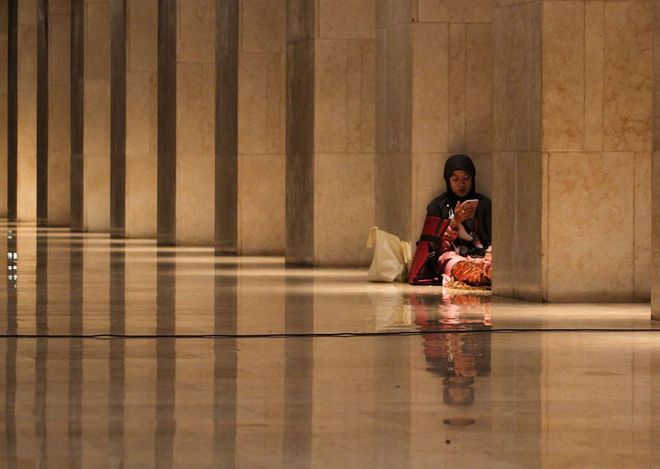Ramadan Is A Time For Reclaiming Self-Care
During the holiday, we’re asked to be fully present and imagine how we might rest in a world that won’t quit.


Photo: Getty Images
Ramadan Is a Time for Reclaiming Self-Care
light a candle and sit listening to the rainfall. I tentatively transcribe the Arabic script of Surah Ad-Duha the way my Islamic schoolteachers taught me: patiently sounding out every syllable I put onto the page. My ability to recite the Quran has diminished over the years, but this slow process is a labor of love. In the silence that washes over me, I feel peace for the first time in months. Not thinking about the next item on my agenda, the coworker I owe an email, or what I will eat for iftar. I am fully present.
Silence is the first thing I notice during Ramadan. In the absence of my social-media accounts, personalized ads for plissé dresses, dainty gold jewelry, and makeup products aren’t seared into my corneas anymore. I’m not dizzying myself with want. A sigh of relief escapes me. It feel like my mind has finally been returned to me after being held captive by algorithms. In the silence, I’m able to face myself, which is daunting. It means gazing inward, seeing my shortcomings, and still recognizing myself as someone worthy of love and care. James Baldwin said that to love someone is to witness them, to recognize your humanity in them. What is a more important love than the one we are supposed to give ourselves?
Related article: Hari Raya: Top Ramadan Bazaars In Singapore To Check Out
In the silence, I face myself. I see my shortcomings and recognize that I’m worthy of care.
Ramadan is a month when Muslims abstain from food, water, and worldly distractions from sunrise to sunset. It is a month based on abstention but rich in growth. Observing Ramadan is a solace from the constant need to consume and produce. It has become a radical act of self-care, a way to sustain myself in a world that often feels at odds with my existence.
Audre Lorde’s definition of self-care is a framework to understand my ever-evolving relationship with Ramadan. “Caring for myself is not an act of self-indulgence, it is self-preservation, and that is an act of political warfare,” she writes in her essay collection A Burst of Light, penned shortly after her second cancer diagnosis. I am not facing cancer, but I am caught in a world that demands my body and mind at all times and slowly breaks them down. Her words take on a different meaning for me now.
Ramadan offers a space for me to detach from the world.
I came into adulthood when self-care was merely cosmetic and highly individual. It was a 10-step skincare routine and impulsive purchases you never thought about because you didn’t need them to begin with. It was something you did in the comfort of your home, in the solitude of a spa. The concept of self-care continues to be deeply tied to capitalism—that to experience satisfaction and become better versions of ourselves, we must purchase things and experiences. But that has begun to change. Lorde’s quote often pops up in social-media feeds in the form of snappy tweets and colorful Instagram graphics, but it feels empty. Self-care cannot be “an act of political warfare” when it is beholden to the status quo.
Related article: 6 Halal Buffets To Break Fast This Ramadan
While some practices of Ramadan are individual by nature, the communal aspect is vital too. We break our fast at sunset with dates, water, milk, rooh afza, watermelon, and anything fresh in season. In the masjid, we pass dates from one person to the next until everyone is fed. We line up shoulder to shoulder, foot to foot, to pray every day in congregation. There is power in a community when capitalism isolates us from one another by design. Knowing that people across the world are observing alongside me is a salve to my hunger. We’re united by the understanding that Ramadan is a transformative, albeit disruptive, reminder of our potential.
For some, Ramadan is an ever-evolving experience. This year, Rand Jitan, a TikTok creator, is advocating for an inclusive, anti-capitalist Ramadan. She finds value in doing nothing.
“There’s nothing more radical than retreating from the world and doing absolutely nothing this Ramadan,” Jitan says. “No matter your background, your wealth status, anyone can participate in this and should,” she says. “Even the things we love about our lives are demanding. Ramadan teaches us awareness of our spiritual selves.”
Ramadan is a transformative, albeit disruptive, reminder of our potential.
Laid bare, Ramadan is a rejection of all things the modern world demands of us, as Mariem Masmoudi writes. It is an intentional step away from overconsumption, hyperconsumerism, and our incessant need to exercise control in every aspect of our lives. When I stay up until 4 a.m. on a random Tuesday, praying in community at the masjid or watching lectures on YouTube, I exist outside the confines of the norm. It’s liberating to know I’m not beholden to these constraints. When you surrender your need to control everything in your life, you make room to rebuild your relationship with yourself and God.
As a Black Muslim woman, I find that sometimes simply existing in the world is exhausting. I inhabit a politicized identity whether I consent to it or not. Ramadan offers a space for me to detach from the world, get reacquainted with my spirituality, and protect my sanity. It’s my act of personal and political warfare in a world that was neither made for me nor provides me solace.
Related article: 7 Sumptuous Halal Buffets To Break Fast At This Ramadan
Jitan, who is queer and Palestinian, feels the same. In a world that invalidates her identity and existence on a multitude of fronts, Ramadan is a time to reclaim what is rightfully hers. “A lot of things have been taken away from me in this world,” Jitan says. “This is my faith. No one can touch this. This is all mine.”
The veil lifts during Ramadan. Any perceived obstructions between you and God are no longer. Feelings of inadequacy and invisibility melt away. The month forces us to operate outside the confines of our capitalist world and demands that we slow down and seek realignment within ourselves. It’s a month of abstention and discipline but also expansive mercy and forgiveness. It’s an experience many can’t put a price on, and perhaps that is the point and the beauty of it all.
This article originally appeared in Harper’s BAZAAR US.